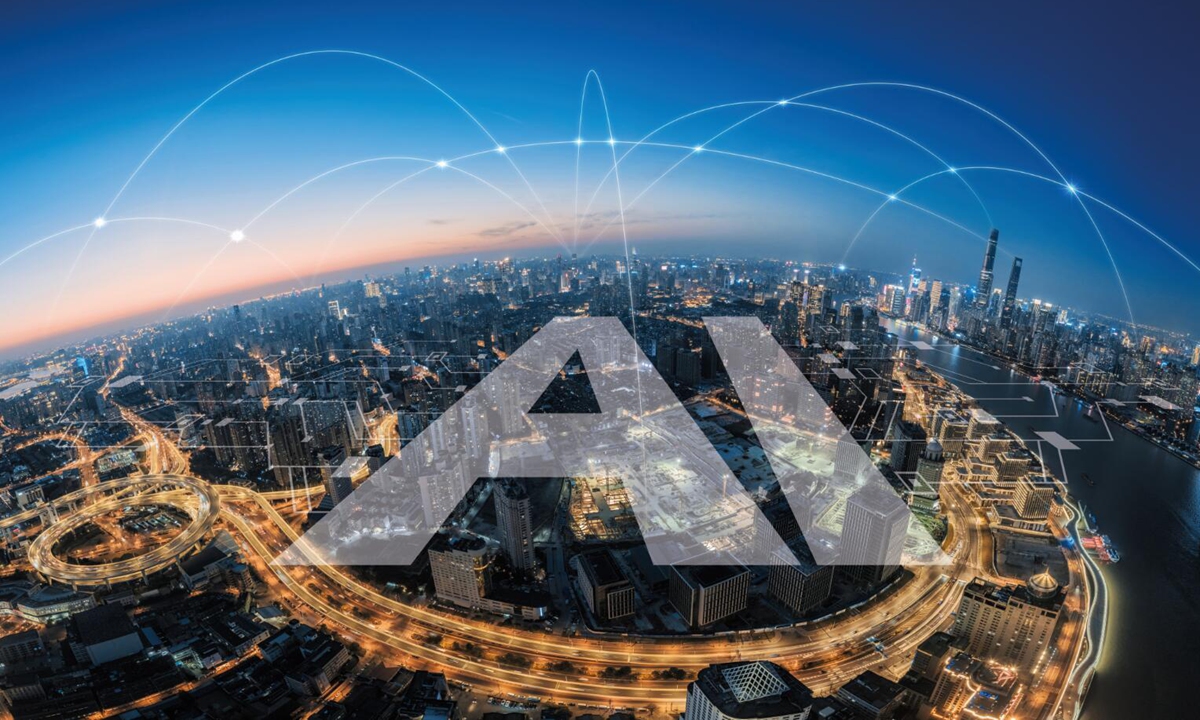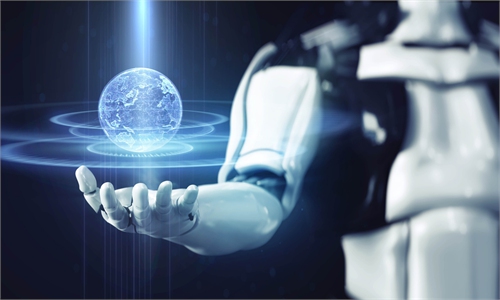Top scientists call for closer global cooperation in countering AI risks at industry forum in Beijing

AI Photo: VCG
Amidst the current artificial intelligence (AI) boom triggered by ChatGPT that is sweeping the globe, leading scientists from across the world have again raised their concerns over the potential uncontrolled risks associated with the technology during an industry conference held in Beijing over the weekend.
While highlighting the possible productivity enhancements that ChatGPT and similar AI can bring, some experts are advocating for international collaboration to establish a robust legal framework to govern the technology.
However, they also note the so-called "decoupling" efforts between Washington and China in the high-tech sector may pose challenges in achieving such cooperation.
Sam Altman, the CEO of OpenAI, is one of the leading figures who spoke at the conference. Speaking via video link on Saturday, Altman stressed the urgency of global cooperation in setting up regulatory "guardrails" for the innovative AI solutions.
Altman garnered resounding applause when he appeared on a large screen at the venue in Zhongguancun, a prominent technology hub in western Beijing. The chief executive of OpenAI predicted that in the next decade, artificial general intelligence systems, commonly called AGI, may surpass human expertise "in nearly every domain," and could eventually exceed the collective productivity of some of the largest companies.
Innovative solutions
"The potential upside here isn't one. AI revolution will create shared wealth and make it possible to dramatically improve the standard of living for everyone. We must manage the risk together in order to get there," Altman said.
In May, hundreds of industry leaders including Altman signed a letter warning that "mitigating the risk of extinction from AI should be a global priority alongside other societal-scale risks such as pandemics and nuclear war." Altman made a point to reference the IAEA, the United Nations nuclear watchdog, as an example of how the world came together to govern nuclear power.
"We need international cooperation to build global trust in the safe development of increasingly powerful AI systems… We will need to devote significant and sustained attention as an international community to get this right," Altman said.
The conference was hosted by the Beijing Academy of Artificial Intelligence, a private non-profit organization engaged in AI research and development. Geoffrey Hinton, known as the AI "godfather" and Turing Award winner Yann André LeCun were among more than a dozen top AI executives and researchers who shared the latest observations and inputs on AI.
"The gathering of numerous distinguished experts, exchanging their in-depth research insights on advancement of AI, is inspiring. This rare gathering of Chinese and American scientists reaffirms my belief that science knows no boundaries," an on-site Chinese researcher who gave him surname as Zhang told the Global Times on Saturday.
China's 'unique role'
AI solutions should be shared by all humanity, and no country can tackle the issue alone, Max Tegmark, a physics professor at MIT, told the forum on Friday. He said China is "uniquely positioned" in AI sector because China is now a world leader in science and technology, and it has the competency to lead the research, and make AI more powerful and trustworthy.
"Since China's international influence is growing with its ability to inspire and the power to shape global AI agenda, including AI regulation, China's voice is really, really important," the professor said.
Tegmark noted the Global Security Initiative being proposed by China. "I really welcome this kind of Chinese wisdom and leadership so that we can have a wonderful future with AI" by continuing to focusing on the technology's development.
"China has some of the best AI talent in the world," Altman said.
While other nations are still cautiously navigating the utilization of the AI tool, China is expected to be one of the first countries to introduce a nationwide AI law, regulating the sector.
In April, China's Cyberspace Administration unveiled a draft law targeting services similar to ChatGPT, a move that highlights China's commitment to regulating and utilizing AI technology. The legislation is set to be reviewed by lawmakers this year.
Experts at the conference said that the call for global collaboration to address AI risks has become louder amid the escalating competition between China and the US, particularly in the high-tech sector where AI has emerged as a critical battleground.
Commitment to AI
In October 2022, the US imposed tech sanctions on China, aimed at restricting China's access to advanced chips essential for AI advancement. Politicians in Washington harbored amplified concerns about the "China threat" and they even advocated for "decoupling" from China.
"We are fully aware of the urgency of AI regulation, but facing geopolitical tensions, forming an international rule to govern AI growth could be hard, though some levels of cooperation might be achievable in certain areas," Wang Peng, a research fellow at the Beijing Academy of Social Sciences, told the Global Times on Saturday.
Looking ahead, the development of large models and major technological breakthroughs is clearly related to "the life and death" of human society, Wang said, noting that it's critical for some nations to drop isolation and retrogressive minds of "high walls," join forces with the rest of the world, and concentrate on overcoming difficulties for the benefit of humankind.
On the growing geopolitical conflict's impact on global AI cooperation, Altman said that "great powers may have their share of differences." This is true today, as it has been before. But even during the most difficult times, great powers have always found ways to cooperate.
"We see great potential for researchers in the US, China and around the world to work together to achieve the shared goal," Altman said, who used an ancient Chinese proverb to prove his points: "A journey of a thousand miles begins with a single step."



